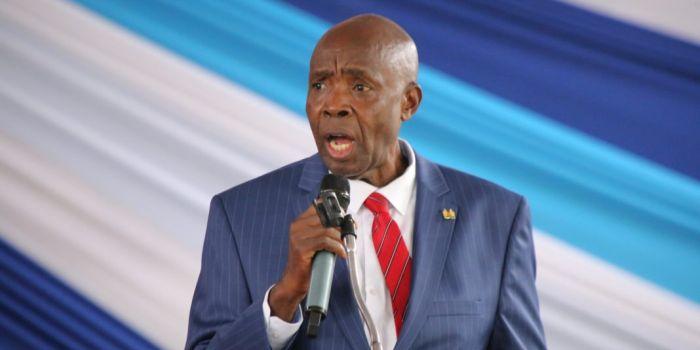Education Ministry on the Spot Over ‘Loss’ of Sh800m
Members of the Public Investments Committee on Education and Governance were left unimpressed after Education Cabinet Secretary Ezekiel Machogu failed to appear before them to answer audit queries regarding government sponsorship of students in private universities.
Mr. Machogu was expected to shed light on a special report by Auditor-General Nancy Gathungu that has flagged the loss of over Sh800 million under the program where the government placed and paid tuition for students in 32 private universities.
The chair of the committee, Bumula MP Jack Wamboka, directed the CS to appear before the MPs on April 11.
The students who were placed in private universities have been caught up in the crossfire as Parliament questions the expenditure, even as the institutions demanded payment of over Sh31.4 billion owed to them by the government.
Gossipa2z.com has established that tuition fees for students have not been paid, with some universities discontinuing their studies while others have retained their certificates upon graduation.
The matter has been presented before the Pending Bills Verification Committee of the National Treasury for consideration.
The sitting was aborted after members dismissed the team from the Ministry of Education led by Higher Education Principal Secretary Beatrice Inyangala.
Audit queries
Others in her entourage were Higher Education Loans Board COE Charles Ringera, Universities Fund boss Geoffrey Monari, Commission for Higher Education CEO Mike Kuria, Kenya Universities and Colleges Central Placement Service CEO Agnes Mercy Wahome, and National Research Fund boss Dickson Andala.
Dr Inyangala said Mr Machogu was attending a committee of the Senate sitting but the MPs said that he is the one responsible for answering the audit queries, which they called weighty.
“This is the third time the CS has failed to appear before this committee and it is unacceptable because the letter by the Senate came after the invitation by this committee. What is the CS hiding? These are policy matters and it’s only the CS who should answer,” said Mr Wamboka.
He said that if Mr. Machogu fails to honor the invite again, the committee will discuss his conduct and recommend penalizing him.
ALSO READ:
- Former Deputy President Rigathi Gachagua Reveals the Truth Behind His Impeachment
- Guatemalan and Salvadoran Troops Land for Haiti Mission
- Puzzle as Woman Is Found Dead in Mysterious Circumstances Close to Her Home
- Cross-Border Attack: Nigerian Gunmen Kill 5 Cameroonian Soldiers in Retaliation
- The Late KNCHR Chairperson Roseline Odede’s Illustrious Career, Awards & Legacy
Ms. Gathungu’s special audit report points out discrepancies in the records of the money spent on the program over seven years.
For instance, the government budgeted Sh15,759,377,812 for disbursement but the records provided by the State Department of Higher Education show that Sh15,762,573,515 was disbursed, resulting in overall over-disbursement of Sh3,195,703.
However, receipts of the disbursement records from the universities indicate that they received a total of Sh15,600,208,031, resulting in a variance of Sh162,365,484 which was not received by the institutions.
Unexplained variance
More puzzling is the figure of Sh15,743,556,129 as given by the Universities Fund (UF) as the amount spent under the program. This gives an unreconciled and unexplained variance of Sh19,017,387.
The government started the program in 2016 after radical reforms to curb cheating in national examinations resulting in drastically fewer qualifiers for university education.
Private universities were left with significantly lower numbers as the government absorbed all who scored a mean grade of C+ and above.
The program was halted last year when new funding for tertiary education was introduced.
Only students in their second, third, or fourth year of study remain in the program.
Private universities have complained that the funding from the government for the students has dropped from the expected 80 percent of the cost of programs to 10 percent in the current financial year.
“This is very low since many programs are very costly and private universities are struggling to educate government-sponsored students. It is therefore important that the amount allocated for this financial year be enhanced to 30 percent DUC to private universities,” reads a letter to Mr Machogu by the treasurer of the Kenya Association of Private Universities Prof Washington Okeyo.
Government scholarships
He is also the vice-chancellor Management University of Africa.
Students who wish to study in private universities do not qualify for government scholarships but can apply for student loans through Helb.
The special audit report shows that after the funds were released by the National Treasury they were not transferred to the Universities Fund for onward transmission to the private universities.
Ms Gathungu further notes that in the seven years under review, only 110,586 students reported to the universities out of the total 153,076, with the rest not taking up their places.
The audit report also revealed that over Sh201.6 million was disbursed to 4,521 students in private universities who had not been placed under the program.
Ms Gathungu goes on to state that over 412.7 million was disbursed to universities for 9,489 students who had exceeded their duration of study.
Another Sh35.2 million was irregularly disbursed to 788 students after they had already graduated from the universities.
Education Ministry on the Spot Over ‘Loss’ of Sh800m
